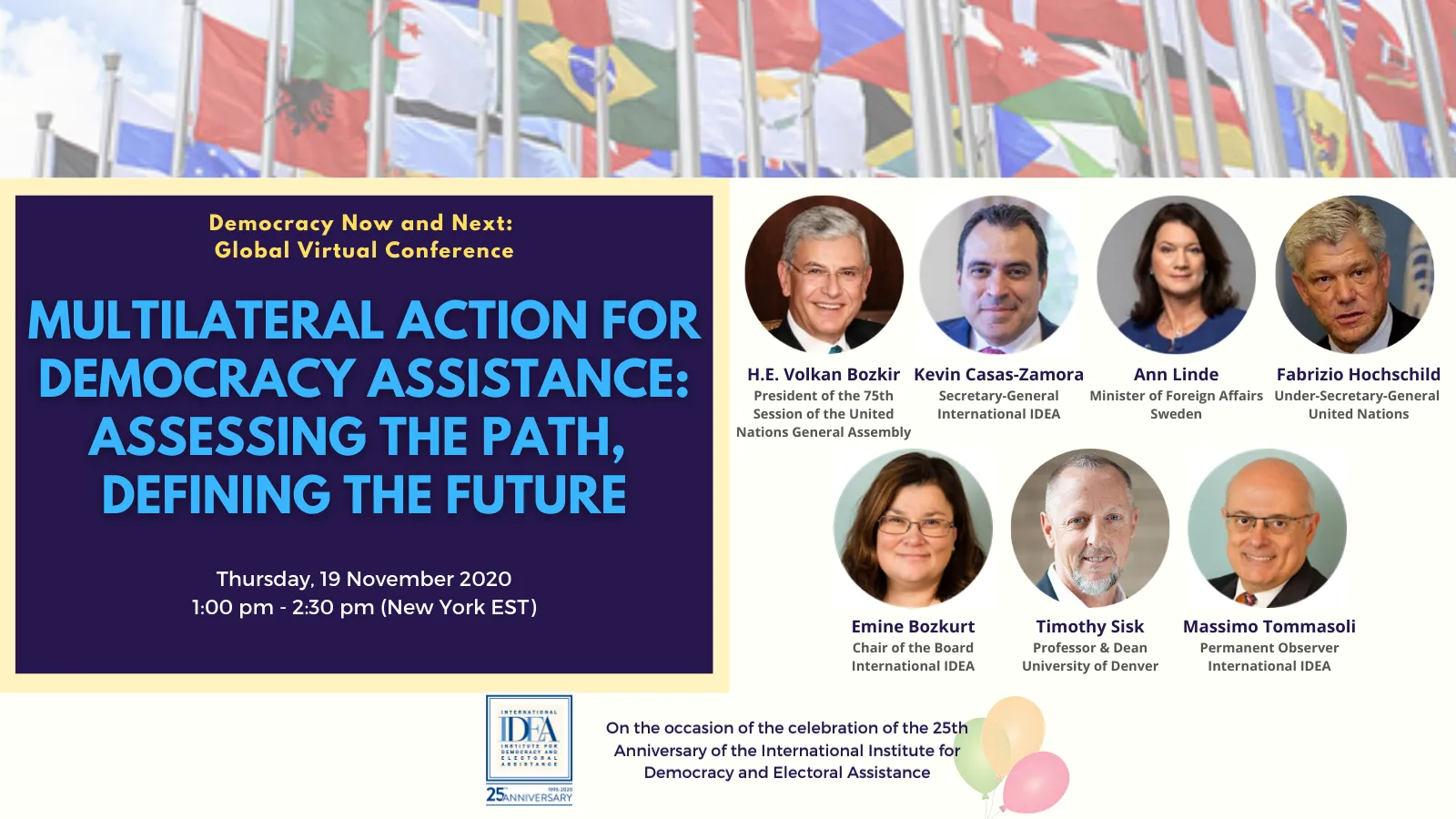Multilateral Action for Democracy Assistance: Assessing the Path, Defining the Future

Members of international organizations, UN diplomats and practitioners gathered on 19 - 20 November 2020 for the global virtual conference “Democracy Now and Next” to commemorate the 25th anniversary of the International Institute for Democracy and Electoral Assistance (International IDEA). The conference offered a tour of democracy around the globe with12 sessions and 63 esteemed speakers celebrating the achievements accomplished by the Institute in all regions of the world. The Office of the Permanent Observer for International IDEA to the United Nations held the event “Multilateral Action for Democracy Assistance: Assessing the Path, Defining the Future” to launch a conversation on the future of International IDEA and its role at the UN, and the role of multilateral action to support democracy.
Permanent Observer for International IDEA to the United Nations, Massimo Tommasoli, introduced the virtual event and the speakers, among which, H.E. Volkan Bozkir, President of the 75th session of the United Nations General Assembly, who began his remarks by highlighting the importance of the three pillars that the UN was founded on—peace and security, development, and human rights—pillars that are intertwined and all equally important. “ Democracy is a core value of the United Nations,” Mr Bozkir stated; and “while the UN does not advocate for a single type of government, it advocates for democracy.” The President also discussed how Covid-19 has negatively impacted all aspects of democratic societies (e.g. elections), and how those institutions cannot be undermined because they are the base principles of our societies as they empower citizens, improve our future, and eradicate inequalities: “the right to vote is crucial to eliminate discrimination.”
President Bozkir advocated for the role of independent press to maintain a healthy democracy by investigating and holding elected officials accountable. “However,” Mr Bozkir warned, “the media can be manipulated and used to undermine our democracies.” The Secretary-General of International IDEA, Kevin Casas-Zamora, joined the PGA in defending the importance of independent press to safeguard democracy: “it’s time to act against the spread of disinformation,” which is an existential threat for democracy.
International IDEA’s Secretary-General also highlighted Sweden as an example of democracy and stressed the need for collective responsibility and a multilateral approach in order to protect our democracy, “which was facing severe headwinds even before the Covid-19 pandemic.” Mr Casas-Zamora pointed out how “those challenges have been accentuated by the pandemic,” which is why it is so crucial to monitor the state of democracy around the world today and be unapologetic about defending democracy: “we need to use our voice to protect democracy.”
Democracy and its crucial role in the promotion and protection of human rights, development and security, was at the center of H.E. Ann Linde’s remarks—Minister of Foreign Affairs of Sweden and Chair of International IDEA’s Council of Member States for 2020—who advocated against any limitation to the enjoyment of human rights: “Covid-19 cannot be an excuse to undermine democratic institutions,” and brought up Sweden as an example of democracy.
The conversation spanned to a view on the future and the priorities for a post-Covid recovery. While multilateralism and collaboration are key elements to a global recovery, a multigenerational view could be crucial during those uncertain and troubled times, added Fabrizio Hochschild, Under-Secretary-General and Special Adviser to the United Nations Secretary-General on the 75th Anniversary of the UN. Mr Hochschild discussed the role of elections in democracies and how crucial it is to have basic services, such as access to education, affordable health care, safe water and sanitation, to build a strong and resilient society: “as important as it is to have an elected government, to have an elected government without government services doesn’t necessarily help democracy. Governments are there to serve the needs of the people, not simply to be elected office holders,” he added.
Professor Timothy Sisk added that “it’s time to re-imagine democracy; how can the UN help in re-imagine it?” While many things have changed since the foundation of International IDEA in 1995, some of the issues regarding democracy are still meaningful and we need to look at trends around the world to understand the quality of democracy today. “The assessment of the state of democracy is crucial,” continued Professor Sisk, “IDEA provides data and clear statistics to underline the trends through research and analysis.”
Covid-19 has uncovered fragilities in democracies around the world and revealed the importance of transparency in democratic institutions. Ms Emine Bozkurt, former Chair of the Board of Advisers at International IDEA, contributed to the conversation by offering a hopeful view on how the crisis of the pandemic could provide an opportunity to renew the social contract and improve our democratic institutions: “the crisis has exposed deep inequalities in our society; economic disadvantages,” Ms Bozkurt added, “we now need to reduce inequalities; invest in education and health; rebuild public trust in institutions.”
The role of International IDEA in fighting corruption was also discussed, as corruption is a highly dangerous threat to democracy, “corruption leads to unequal access to institutions, undermines equality of participation in democracy,” stressed Timothy Sisk.
Massimo Tommasoli concluded by reiterating the importance of intergenerational policies and approaches to defend democracy, fight inequalities and advocate for multilateralism. Democracy is not in static condition and the next 25 years will be crucial to the promotion of democracy and human rights.
(The full event can be accessed through International IDEA's YouTube Channel)



